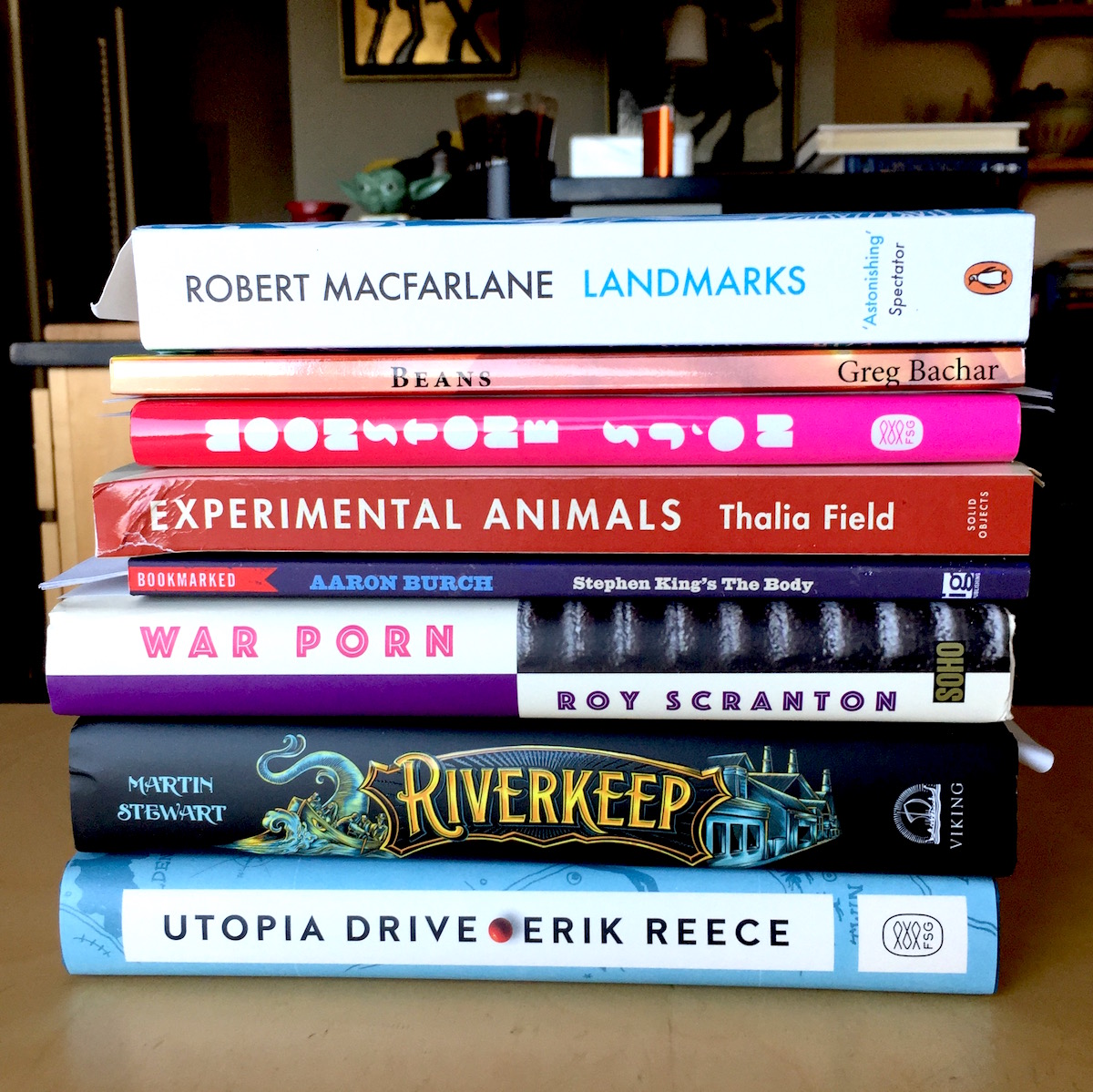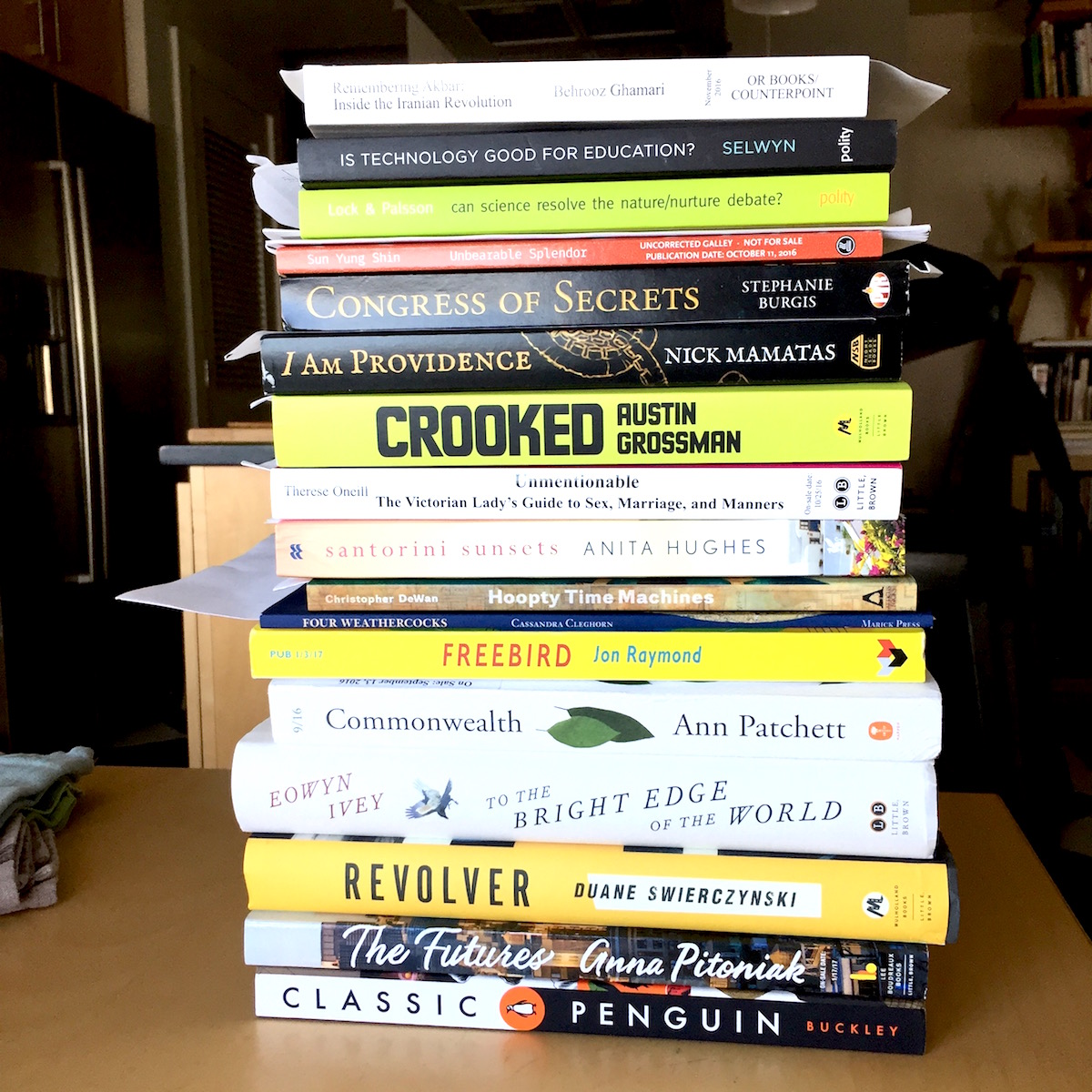You down with RBG?
Published July 25, 2016, at 11:55am
An examination of one of the weirdest — and coolest — popular reappraisals in American political history.
Here's what Vlad from Third Place Books is most looking forward to this fall
This month, I’ve been asking booksellers to name their summer reading picks. It’s been delightful. But the problem with asking booksellers about books they recommend for the summer is that most of them are likely already reading books that will be coming out this fall. Librarians and booksellers are often months ahead on the new-release front.

But Vlad is also getting ready for the fall, and in addition to new novels from Alan Moore and Warren Ellis, a kids’ book from Shaun Tan, and a non-fiction book about time travel from science writer James Gleick, he’s most excited for his customers to get their hands on Colson Whitehead’s novel The Underground Railroad, which he said left him “floored.” “The topic is always troubling and harrowing…” Vlad writes in an email,
…but what fascinated me was Whitehead's unflinching exploration of the various manifestations of the economics of slavery — the way slave-owners talked about them, the subtle social cues, the levels of 'owning' another human being. The numbing idea of slaves (and their wounds) as walking ledgers of atrocity.
Vlad is not the only bookseller or librarian to talk up Underground Railroad to me; it’s set to be one of the biggest books of the fall. You should reserve a copy at your favorite bookstore today. Here’s the link to reserve it at Third Place Books; tell them Vlad sent you.
In his role as the curator, editor, and printer of Third Place Press, Vlad is most looking forward to putting out “an anthology of writing and art from the South Seattle Emerald” this fall. Vlad has been working in conjunction with Emerald publisher Marcus Green to make a vibrant and artistic collection. The Emerald is one of Seattle’s most energetic young publications, and this physical collection is a great way to affirm its voice and its place in the city. We’ll let you know when it’s available this fall.
The Sunday Post for July 24, 2016
I’m With The Banned
This piece is terrifying and I admire Laurie Penny for experiencing this. Milo Yiannopoulos’ joie de vivre comes from the tsunami-sized waves of attention he receives. Whether it’s good or bad attention is unimportant. Being banned from Twitter is great news for those he abuses and offends, but it’s seemingly even better news for Milo because the spotlight is his once more. So it’s technically a win-win, but infuriatingly so.
Just as we set off, news breaks that Milo has been suspended from Twitter. A frenzy of jubilant activity: this is a huge win for Milo and his brand. He’ll be trending worldwide within the hour.
Why Calvin and Hobbes is Great Literature
Before I discovered crosswords and Will Shortz in high school, and before I become an English major in college, I would thumb through the paper and fold it every which way to get to the comics. That is completely expected from kids — comics and cartoons are considered light entertainment, as Gabrielle Bellot points out. But Calvin and Hobbes, which ran from 1985 to 1995, actually deals with pretty important themes, and its creator Bill Watterson allowed the comic strip to be whatever people needed it to be.
In Watterson’s words, Hobbes’s true nature is never fully defined by the strip, which is one of its beauties; Hobbes is a kind of ontological marvel, and yet utterly mundane all the same, for he is whatever he needs to be for whomever is perceiving him.
Calvin and Hobbes feels so inventive because it is: the strips take us to new planets, to parodies of film noir, to the Cretaceous period, to encounters with aliens in American suburbs and bicycles coming to life and reality itself being revised into Cubist art. Calvin and Hobbes ponder whether or not life and art have any meaning — often while careening off the edge of a cliff on a wagon or sled.
‘I Feel a Deep Sense of Remorse,’ Donald Trump’s Ghostwriter Says
Alan Rappeport highlights some pieces of an interview with Tony Schwartz, Trump’s ghostwriter in the 80s. That The Art of the Deal is a work of fiction comes as no surprise, frankly. And isn’t it comforting to know that Schwartz would rename our presidential candidate’s biography The Sociopath?
"I feel a deep sense of remorse that I contributed to presenting Trump in a way that brought him wider attention and made him more appealing than he is," Mr. Schwartz said. "I genuinely believe that if Trump wins and gets the nuclear codes, there is an excellent possibility it will lead to the end of civilization."
Shedding light on the dark web
The internet is wide and deep and has way more hidden corners than I imagined. But there’s also the dark web, where anything goes. Mostly it’s used for illicit and prescription drugs, but it’s amusing to see some people use it for ebooks and gift cards. Keep on keeping on, whoever you are.
Online drug markets are part of the “dark web”: sites only accessible through browsers such as Tor, which route communications via several computers and layers of encryption, making them almost impossible for law enforcement to track. Buyers and sellers make contact using e-mail providers such as Sigaint, a secure dark-web service, and encryption software such as Pretty Good Privacy (PGP). They settle up in bitcoin, a digital currency that can be exchanged for the old-fashioned sort and that offers near-anonymity during a deal.
Beauties / Beasts - Kickstarter Fund Project #29
Every week, the Seattle Review of Books backs a Kickstarter, and writes up why we picked that particular project. Read more about the project here. Suggest a project by writing to kickstarter at this domain, or by using our contact form.
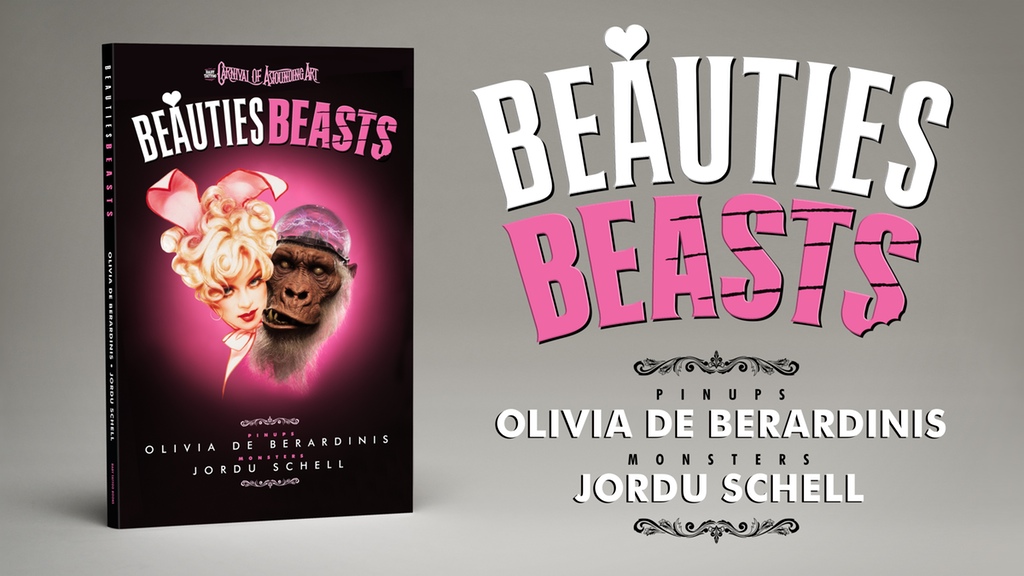
What's the project this week?
Beauties / Beasts. We've put $20 in as a non-reward backer
Who is the Creator?
What do they have to say about the project?
A sexy combination of Pinups and Creatures from world-renowned artist Olivia De Berardinis and master monster-maker Jordu Schell!
What caught your eye?
Olivia is the most well-respected living pinup artist. Jordu Schell is a master monster sculptor, who has worked on dozens of movies, making creatures we love to hate. This book brings together their art to explore the trope of beauty and the beast — both artists see them as an expression of fantasy.
As a man who wrote a novel about pinups, Olivia (like photographer Bunny Yeager before her) has always been fascinating to me, because of the different approach women have to creating sexualized, idealized imagery of women. "I'm looking for a very confident, sensual, sexual woman who is not impeded by any second thoughts, like I am," she says in the video.
Why should I back it?
If you're into movie monsters, or the work of filmmakers like Guillermo del Toro, you'll find a lot to love in the beautifully shot monster masks. If you're also into pinup artwork, then you'll the combination probably pretty hard to resist. The book itself look gorgeous, nicely designed and packaged, and a hardcover signed by both artists is only $50.
How's the project doing?
They're about 50% funded with 27 days to go. Looks like they're on a good trajectory, but you could help assure that they make it.
Do they have a video?
Kickstarter Fund Stats
- Projects backed: 29
- Funds pledged: $580
- Funds collected: $520
- Unsuccessful pledges: 1
- Fund balance: $460
Book News Roundup: G. Willow Wilson reads from her new novel, Roxane Gay to write a Marvel Comic
- San Diego Comic Con is happening right now, and most of the stories coming out of the convention could just as easily be press releases. But when you get that many creative people in one space at one time, interesting things will happen. For instance, Seattle author G. Willow Wilson gave the first public reading from her upcoming second novel, The Bird King. Rich Johnston at Bleeding Cool writes:
Wilson treated her audience to a reading of the first chapter of The Bird King. The first chapter follows the young concubine Fatima as she slips out of her harem quarters to visit her friend Hassan. Fatima has become obsessed with an outdated map, and longs to see the world outside of the palace walls. Willow takes great care in describing her world, inviting her captive audience into the detailed and vibrant world she has created. The Bird King has no set release date.
But some Comic Con-style press releases are more newsworthy than others: the New York Times just reported that Roxane Gay and poet Yona Harvey are publishing a new series with Marvel Comics titled World of Wakanda. It will be a spin-off series from Ta-Nehisi Coates's excellent Black Panther comics. Here's a quote from Gay that I love: “The opportunity to write black women and queer black women into the Marvel universe, there’s no saying no to that."
In non-comic-related news, you should read this profile of the owners of the only romance-only bookshop in the United States over at the eminently bookmarkable website Badass Ladies You Should Know.
Donald Trump's story is broken
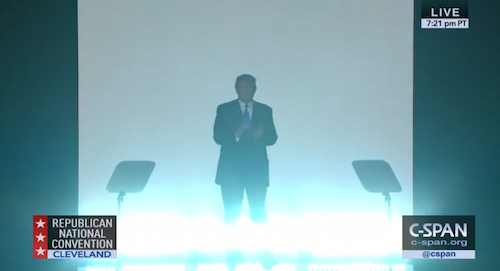
Political conventions are stories. Every four years, the two major political parties come together in conventions to tell us stories about America. These stories are almost always told in three parts: where we came from as a nation, what’s happening to us now, and finally, where we’re going.
The interesting part of collaborative storytelling is that when more than one person gathers to tell a story, that story becomes a living force, with its own agenda. And so every convention is more than the sum of its parts. Through mistakes, personal agendas, and happenstance, the story a convention tells is always different than the story its presidential candidate wants to tell. But the story that the convention tells in aggregate is often more honest than the story that the candidate wants us to hear. In fact, the story that a convention tells is usually a fairly clear indicator of a candidate's worldview, and a decent forecast of how they intend to govern.
So what just happened at the Republican National Convention in Cleveland?
Many hundreds of commentators have acknowledged the Trump campaign’s innate racism, and pointed out how Donald Trump encourages white Americans to fear and loathe minorities. And many others have pointed out the Trump campaign’s inherent fascism, that the rise of this bumbling billionaire bears a striking resemblance to the rise of Hitler or Mussolini. These observations are entirely true.
In fact, on every night of the convention you could find some new piece of evidence of the party’s racism or fascism to stack against Trump’s Republican Party — Steve King’s homage to white supremacy over inferior “sub-groups,” Rudy Giuliani’s over-the-top carnival barker routine where he stoked fear of Islam and agitated for unlimited government power under the auspices of security.
The dog whistle was traded out for a tuba. Many of the speakers talked in terms of “us” and “them,” of “normal America” or of a time when America was truly “great." This is code by, for, and about white people, and it hints back to a time when white Christian men were the favored demographic, and everyone else was labeled, at best, a third-class citizen. Others, including Trump himself, used terms like “law and order” or “America first.” Those are labels of agitation with a long history in American politics. These are the words you use to mobilize bigots and white supremacists, to prepare them for battle.
For me, aside from Trump’s closing night speech — about which more soon — the most shocking moment of the RNC was New Jersey Governor Chris Christie’s speech. Christie, a former prosecutor, led the crowd through a ghoulish call-and-response show trial. He trotted out the usual conservative charges against Hillary Clinton and then repeatedly asked the audience if they believed she was guilty or not guilty. Of course, they shouted “GUILTY!” every time. Occasionally, they started chants of “LOCK! HER! UP!” which was a common refrain all week long in Cleveland.
As a (by most accounts skilled) prosecutor, Christie should have enough respect for the law to understand that his pantomime in Cleveland represented a gross caricature of the justice system. He was playing judge, jury, and executioner, and by roping the crowd into his kangaroo court, he was setting a dangerous precedent. I do not believe it was a coincidence that the morning after Christie’s trial of Hillary Clinton, a Trump ally called for Clinton to be “put in the firing line and shot for treason.” That unacceptable threat of violence is a direct consequence of Christie’s cavalier attitude, and it will create still more unacceptable threats of violence through the rest of the summer and fall.
The problem with shock and outrage is that they exist in a continuous state of retreat. You can’t perpetually feel shock. You can’t keep being outraged by the exact same thing over and over. Every time you’re shocked by something a politician says, you’re a little more jaded, you’ve grown a little more scar tissue, and the next politician is going to have to say something a little more outrageous to get a reaction out of you. I worry what will happen next, because the most shocking thing I can imagine right now is a Donald Trump-like figure who knows how to conceal his message a little more effectively than Donald Trump.
But let’s leave the analysis of the racism and fascism to other writers; from where I sit it’s very well-documented. What I’d like to talk about is the central failure of the RNC, by which I mean its total inability to tell a story.
There are two major flaws with the story that Trump told over the last four days. First of all is a problem with the suspension of disbelief. Donald Trump’s RNC acceptance speech was the darkest, dourest acceptance speech of all time. He portrayed America as a hellscape where crime lurks around every corner. To hear him tell it, a horde of terrorists sit crouched in the air ducts of every suburban mall in the nation, just waiting to slit the throats of your children. (In case there’s any doubt here, these claims are all false; Vox published a good debunking of every so-called “fact” in Trump’s speech last night.)
Some speakers didn’t even try to identify a real problem when they talked. Instead, they just dwelled on how things “feel” wrong nowadays. Television actor Scott Baio told the audience that in America, “there's no stability and nothing seems right” anymore. He could not have been more vague without delivering his speech solely in grunts and hand gestures.
It's appropriate that this RNC coincided with the firing of Fox News mastermind Roger Ailes, because Donald Trump is the candidate that Fox News created, the apex of the Fox News narrative. For decades, Fox has pumped a dystopian storyline into the eyes and ears of Americans. They have created an America where everyone is out to get you, where half of all Americans are bad people who want to steal from the good Americans, to thrive unjustly on the fruits of everyone else's labor. They have told the story of a besieged America that is still, by dint of our guns and our freedoms, the safest nation on a hellhole planet. The fictional, fear-based America of Fox News is the America that Donald Trump wants to rule over.
But I do not believe that most Americans see Trump’s dystopian world every day when they open their curtains in the morning. Don’t get me wrong; I’m not saying that America is perfect, or that we don’t have any problems. On the contrary, in America problems are baked into our Constitution. We were perhaps the first government in the world to anticipate problems as a vital part of the process. But the problems that many Americans see every day — income inequality, increasing poverty — bear no relationship to the problems that Trump describes.
Negativity can absolutely win a presidential campaign. Most recently, George W. Bush beat John Kerry with negativity in 2004. But the question that concerns us now is this: can a negativity that is this toxic win a presidential campaign? Can you win solely on negativity? Most presidential candidates leaven their fear with appeals to our better nature: thoughts on character, praise of the American experiment, a celebration of the American spirit. Trump had no time for that hogwash on Thursday night. He started his speech with an argument that good, decent (white) Americans were going to get murdered in the streets (presumably by black people) and he spent a long chunk of the speech picking fights with every nation in the Middle East that is not Israel. He wants wars on crime and Islam and minorities, but he doesn’t want to pay for those wars. Which brings us to the other problem with the RNC’s storytelling: The story that was told at the RNC was not actually a story.
I keep thinking of a meme that was very popular a few years ago. It was lifted entirely from a second-season South Park episode, and it looks like this:
- Collect underpants.
- ?
- PROFIT
Coincidentally, this is the same structure used by the Trump campaign to identify and address problems. Here are the policies that Trump unveiled in his speech last night:
- America doesn’t win anymore.
- ?
- America is great again!
and
- More crime.
- ?
- Less crime.
and
- Wars in scary foreign countries.
- ?
- Win the wars, install freedom everywhere.
See? Easy. Trump, who to hear his daughter Ivanka tell it, is supposedly out in the world supervising building sites nearly every day, is supposed to be knowledgeable about construction. If that’s true, why can’t he build a decent story? Read almost any how-to-write book and you’ll see that a story is the solution (or failed solution) of a problem. Almost every movie you've ever seen follows this plot: introduce the problem and then show how the problem gets fixed.
Trump offered no policies. He showed no interest in the mechanics of solutions. For him, there is only before and after, with no middle. "Before” is a tableau of Trump surveying a problem. “After” is, in Trump’s mind, the point when the problem has been solved and America is Great Again. There is no connective tissue, no room for debate or ideas. You simply go from "Once upon a time" to "happily ever after." It’s uninteresting and exhausting as a storytelling technique.
So the story Trump told was full of lies and not even functionally a story, but he’s still attracting fans with shock value. For now, the shock value is working. But we know what happens to shock value; as a concept it wears itself out. What is Donald Trump going to do when he stops shocking people? That, to me, is the most horrifying question.
Now the RNC is over, and everyone is going home. Democrats are preparing for their national convention next week, to tell their own story. This time in between conventions is always a nerve-wracking weekend, but this weekend feels especially suspenseful. And once the DNC is done, next Friday is the official start of the general election season; it’s the day when the candidates turn their stories outward to the general election and to the entire population of America. It’s when we see how effective those stories really are.
I do not yet know what kind of a story the DNC will tell us next week, but I can tell you what I want to see there: I want it to be a story that promotes problems and solutions. I want it to look like the — to steal the Republican language for a moment — real America, the one outside our windows, not the one inside our televisions. I want it to be a story about being decent and human and proud of your country and a part of a larger history. I want the American story to be one of resilience and intelligence and good humor and inclusiveness. Because if Donald J. Trump were to win the White House, we already know what kind of story he’d tell us: a broken one. And a broken story can absolutely and irreparably break the heart of a nation.
The Help Desk: You can't dog ear a Facebook
Every Friday, Cienna Madrid offers solutions to life’s most vexing literary problems. Do you need a book recommendation to send your worst cousin on her birthday? Is it okay to read erotica on public transit? Cienna can help. Send your questions to advice@seattlereviewofbooks.com.
Dear Cienna,
I’m friends with my local used bookseller. She recommends books to me, and I recommend books to her, and I sell books back to her, and everything is pretty great, for the most part. I know I’m lucky to have such a wonderful bookseller in my life.
But the other day, after I brought a big haul of books in to sell to her, my bookseller friend left a note on my Facebook wall that said, and I quote, “Stop dog earing your books!” Please bear in mind that this note came after she gave me over a hundred dollars in store credit for those books. She didn’t mention the dog-earing at all during the entire transaction while I was in the store.
It’s true that I dog-ear my books, Cienna, and I know it’s not okay. It’s a bad habit, like pulling out your own eyebrows or picking at pimples. But I feel a little hurt by the public shaming, especially considering that she’s never brought this up to my face.
Now I don’t want to go into the bookstore anymore, and I know that’s reactionary of me and more than a little silly. How do I salvage this relationship? Or should I only buy used books online from now on?
Danielle, Edmonds
Dear Danielle,
I assume your bookseller friend is a decent person because all used booksellers I've ever met are much better people than me – the kind of people who don't try to lure neighborhood children into their basement just to prove what bad parents they have.
Nevertheless, even booksellers can be cowards when it comes to interpersonal confrontations. Most of us would prefer to avoid the emotional feedback we receive – the hurt, confusion, embarrassment – when we tell someone we care about something that they probably don't want to hear. So we email them our criticisms. We text. We Facebook. And while that eliminates the special hell of an awkward interaction, our victim doesn't get the reassurances that physical feedback provides – tone, eye contact, a smile, maybe a hug. The mostly nonverbal cues that let people know they are valued, even when being criticized.
Receiving criticism via social media feels like a slap you didn't see coming, even if it is well-intentioned. I know the urge is to respond in kind digitally, but I don't recommend it. I recently did this and it cost me two friendships – one human, the other a spider I had named after my friend, who I had to ritualistically kill, dismember, and mail to my ex-friend in 11 tiny envelopes.
It takes guts to confront someone about their behavior. It's hard. But that is how strong friendships are built – in person, not over social media or texts. So this is what I suggest you do: Visit your favorite used bookstore like normal, buy a few books, and when your bookseller friend is ringing you up, say something like, "I think you owe me a happy hour drink." When she asks why, explain to her that you were a little embarrassed and offended that she chose to criticize you over Facebook for dog-earing your books, and that in the future, you'd prefer it if she talked to you in person about the physical state of the books you bring in for trade. But that she can make it up to you with that drink.
Kisses,
Cienna
Portrait Gallery - Carla Hayden
Each week, Christine Marie Larsen creates a portrait of a new author for us. Have any favorites you’d love to see immortalized? Let us know
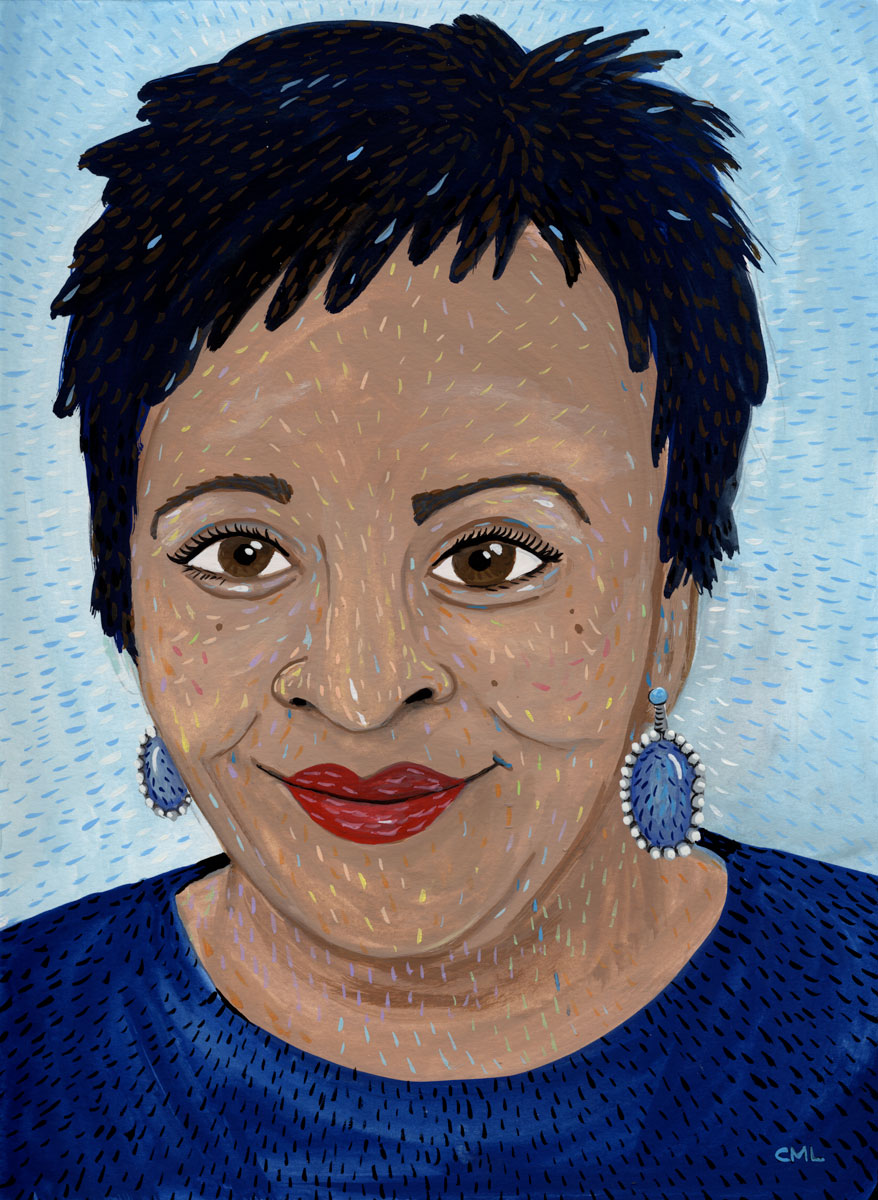
Carla Hayden is the 14th Librarian of Congress! But, more importantly, she's the first female and first black Librarian of Congress — the thirteen before her have all been white men. Also, she's actually a librarian (with a doctorate in library science from U Chicago), which hasn't been the case since the 70s. Hayden was the President of the American Library Association as well as the CEO of Enoch Pratt Free Library. She started her career at the Chicago Public Library, where the Obamas got to know and befriend her. Read more about her history and achievements.
Bad Monkeys optioned for film
One of my favorite things about Seattle novelist Matt Ruff is how his fans seem to be evenly split on their favorite book of his. Each of his books are so different from all the others that his fans have split into fiefdoms. Some prefer Fool on the Hill. Others have fallen hard for his newest, Lovecraft Country. The one that's most satisfying for me is Set This House in Order.
But Bad Monkeys is probably the Matt Ruff novel that more people have told me they love best. Something about the lean book's twisty plot and its central question — is the main character really a super-spy, or is she mentally ill, or both? — resonate with readers. And a lot of those readers will probably find this news from Patrick Hipes at Deadline to be very exciting:
Universal Pictures has optioned rights to Matt Ruff’s novel Bad Monkeys, a psychological thriller to be adapted as a feature by Bluegrass Films’ Scott Stuber and Dylan Clark. They will produce with Margot Robbie for her LuckyChap Entertainment, with Robbie also attached to star.
Margot Robbie is a rising star, having made her mark in The Wolf of Wall Street and The Big Short. Her upcoming performance in the comic book movie Suicide Squad is already getting rave reviews. And she just recently passed a critical milestone for women in Hollywood: she's been the subject of an incredibly creepy profile in a major magazine.
If Suicide Squad hits big, I'd expect Bad Monkeys to get fast-tracked. And if Bad Monkeys hits big, hopefully more readers will find their way to Ruff; we could use more voices in the great "Which Ruff novel is your favorite?" debate.
We use a modified Chicago style here on the Seattle Review of Books. Recently, editing a piece that used the term ‘ebook’ sparked a discussion over which was better: ‘e-book’ or ‘ebook’? To our eyes, ‘e-mail’ seems antiquated (we use ‘email’), but are electronic books different? They are more modern, after all. If we have to designated something as electronic, as opposed to analog, is the hyphen still necessary?
Help us decide. Take our first Twitter poll!
Readers, a style question: @ChicagoManual uses ‘e-book’. Should we drop the hyphen and use ‘ebook’ on our site?
— Review of Books (@seattlereviewof) July 21, 2016
Thursday Comics Hangover: Jeff Bezos, destroyer of worlds
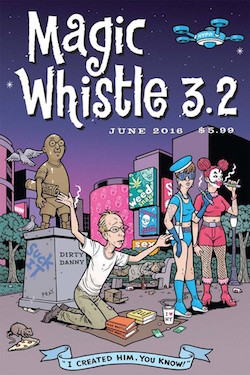
Seattle cartoonist Tom Van Deusen’s six-page strip “Bezos” opens with Amazon founder Jeff Bezos pouring himself a coffee in a nice-but-not-extravagant kitchen. He talks to his cylindrical Amazon Echo device in the corner. “Good morning, Alexa,” he says. “Good morning, Jeff Bezos,” Alexa replies.
Bezos takes a sip of coffee. He stares at his e-reader. Then he exclaims: “I love reading on my Amazon Kindle! Why would anyone want to read a book? All those pages — BLECH!” He turns back to the black cylinder on his kitchen counter: “Alexa, did I ever tell you that I hate books?”
“Yes, Jeff Bezos,” the Echo replies.
The strip goes on from there, opening as a parody of Amazon-style consumer technology but then spinning into outright farce as Bezos goes on a rampage around town. Van Deusen packs a lot of stuff into six pages, and I’d hate to spoil it all. But without giving too much away, I want to tell you that — and in a year that saw the end of Intruder, this is really saying something — this is one of the most important Seattle comics to be published in 2016.
In these six pages, Van Deusen renders the creator of Amazon as a pathetic figure, an egomaniac, a narcissist, a loser, a needy creep, a conqueror, and a sad sack. His Bezos is a prism depicting nearly every single popular belief Seattleites hold about the man, an inconsistent enigma who barely seems aware of the disastrous consequences of his actions because he can barely hold his own fragile identity together.
“Bezos” is sarcastic, furious, funny, and more than a little bit mean. It doesn’t feel like a goofy comic strip about a popular figure. It feels, somehow, like journalism. Somewhere in this spray of black-and-white panels about giant robots and the horror of modern interior design, Van Deusen managed to squeeze in the entirety of Seattle’s current dilemma.
This morning, APRIL Festival co-founder Willie Fitzgerald introduced us to the idea of Poetweet, a website that searches your Twitter feed and turns it into a poem. (The site is a very clever promotion for the B_arco Cultural Center in Brazil.) I ran the Seattle Review of Books Twitter feed through, and here's what happened:
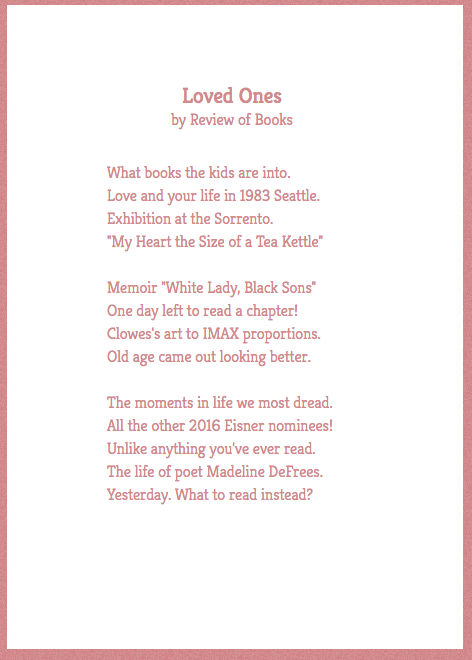
Your Week in Readings: The Best Literary Events from July 20th - July 26th
Wednesday July 20: Remembering Healing Celebrating
Five Seattle-area poets — Priscilla Long, Jack Remick, Holly Hughes, John Wright, and Bethany Reid — read new work about “the past, lost poets, extinct birds, lost loves, and extending and expanding the meanings of elegy.” One of the top three best uses of poetry is remembering. (The other two? Sex and jokes.) Third Place Books Ravenna, 6504 20th Ave NE, 525-2347 http://thirdplacebooks.com. Free. All ages. 7 p.m.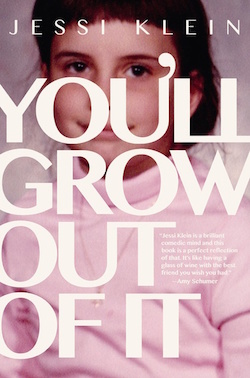
Thursday July 21: You'll Grow Out Of It Reading
Inside Amy Schumer head writer Jessi Klein’s memoir addresses what it means to be a woman in the 21st century. Tonight, beloved Seattle author Lindy West will join Klein in a far-reaching conversation about femininity, the idea of being a tomboy, and whether or not it’s biologically possible for men to be funny. University Book Store, 4326 University Way N.E., 634-3400, http://bookstore.washington.edu. $27.50. All ages. 8 p.m.Friday July 22: Welcome to Night Vale
The horror/comedy podcast Welcome to Night Vale gets credit for being hilarious and inventive, but it’s also an impressive serial writing achievement: installment by installment, and in tonight’s live show, Welcome to Night Vale is building a mythology on the backs of American horror legends like Poe and Lovecraft. Benaroya Hall, 200 University St., 215-4747, http://seattlesymphony.org. $27.50. All ages. 8 p.m.Saturday July 23: Rainier BAAMFest
Today’s Rainier Beach Arts and Music Fest features visual arts, crafts, dance, and music. But because I’m a book guy, let’s focus on the literary offerings, including spoken word, graphic novel-making workshops, Coast Salish storytelling, and a performance by Seattle-area spoken word dynamo Reagan Jackson. Rainier Beach Community Center and Pool, 8825 Rainier Ave S., 386-1925, http://facebook.com/BAAMFest. Free. All ages. 11 a.m.Sunday July 24: Alice & Lucy Will Work for Bunk Beds Reading
You know who loves going to readings? Kids. This is because kids are better than adults, who waste all their time binge-watching Law & Order and reading hot takes about Pokémon Go. Seattle author Jaime Temairik debuts her new kids’ book with a reading and a literal cake walk at her neighborhood bookstore. Secret Garden Books, 2214 NW Market St., 789-5006, http://secretgardenbooks.com, free, all ages, 1 p.m.Monday July 25: The Heavenly Table Reading
See our Event of the Week column for more details. Elliott Bay Book Company, 1521 10th Ave, 624-6600, http://elliottbaybook.com . Free. All ages. 7 p.m
Tuesday July 26: Clarion West Presents Geoff Ryman
Geoff Ryman is probably one of the most underappreciated living legends of sci-fi. Perhaps best-known for his multi-tiered Oz-centric fantasia Was, Ryman also created a hyperlinked online novel called 253 that was decades ahead of its time. This should be a rare peek inside the mind of a singular genius. Seattle Seattle Public Library, 1000 4th Ave., 386-4636, http://spl.org. Free. All ages. 7 p.m.Literary Event of the Week: Donald Ray Pollock at Elliott Bay Book Company
You can pinpoint the origins of Donald Ray Pollock’s literary genius directly to a town in Ohio called Knockemstiff. Pollock was born and raised there, and he worked in a nearby paper mill for three decades. With a population just under 60,000, Knockemstiff is the kind of town that you don’t typically find in contemporary American literary fiction; half-rotten by meth, starved for hope, and entirely broke, it’s about as far away from the world presented in Jonathan Franzen’s novels as you can imagine.
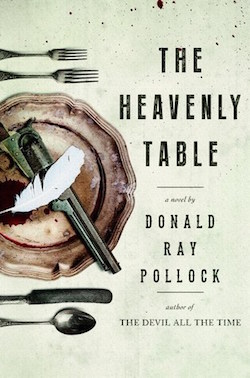
Pollock titled his first collection of stories Knockemstiff, and except for a piece of one story titled “Honolulu,” the entirety of the book takes place in the Ohio town of the title. The characters are blue collar, prone to eating bologna, given to occasional fits of violence. It was one of the best debuts of the first decade of the 21st century. His first novel, The Devil All the Time, is about a serial killer in Knockemstiff. And his newest novel, The Heavenly Table, tells the story of a family feud set in the early days of the 20th century.
All of Pollock’s interests are on display in Table: the effect of technology on work, the rippling impact of violence, the desperate decisions that lead to crimes, and the difference between the America of our dreams and the real America of the heartland. If this sounds way too serious, I’m failing at my job, because Pollock’s sense of humor is dark and broad; characters in this book are obsessed with a pulp fiction hero named Bloody Bill Bucket.
When Knockemstiff debuted, Pollock faced a lot of comparisons with Sherwood Anderson’s classic novel Winesburg, Ohio. It’s easy to see why those connections were made: big casts of interconnected characters, small-town America, Ohio. And Pollock himself seemed (rightfully) flattered by the comparison.
But if Pollock is a modern-day Anderson, it’s by way of authors like Harry Crews, Chuck Palahniuk, or the Bret Easton Ellis of American Psycho. While Pollock doesn’t revel in violence for entertainment’s sake, he’s not afraid to painstakingly lay out a gruesome scene in order to make a point. America’s heart has a hole in it, and the blood is getting absolutely everywhere.
Elliott Bay Book Company, 1521 10th Ave, 624-6600, elliottbaybook.com . Free. All ages. Monday, July 25th at 7 p.m.
Book News Roundup: Donald Trump's reading list is as small as his hands
- In a month — hell, a year — loaded down with bad news, I urge you to read Seattle author Nicola Griffith's triumphant blog post celebrating an exciting new literary award:
I did that. Me. A global $50,000 prize to support stories about women—by writers from nearly 60 countries—happened because I wrote one blog post about something that’s bugged me for years: that books about women don’t win awards.
Would you care to guess what Donald Trump reads? Is "not much of anything" your answer? The good news is, you're right! (The bad news is: you're right.)
It is not every day that you get news of a new Earthsea story from Ursula K. LeGuin. It's set to be published in an omnibus edition in 2018:
Readers may be unacquainted with “The Daughter of Odren” considering it was published two years ago and only as an ebook. The story is set in the familiar world of Earthsea, and in an Odyssean key, focuses on a daughter — Weed — awaiting the return of her father, Lord Garnet. According to a blurb on fantasticfiction.com, “Odren” is “a hauntingly beautiful tale of betrayal and revenge.” With the publication of the all-in-one Earthsea, it will be the first time “Odren” appears in print.
The Spectator says the secret to enjoyable holiday reading is to bring a smaller selection of books, so you're not overwhelmed. This is wrong. The secret to enjoyable holiday reading is to take a lot of books and to pass the books on to free libraries and other readers as you go, thereby making your bag lighter as your vacation continues.
Gird your loins: Twilight author Stephenie Meyer has written a spy thriller for adult audiences, and it will be published in November of this year.
The one where we talk about books and sitcoms
Published July 19, 2016, at 12:00pm
Hanya Yanagihara and Diane Williams offer a certain kind of prosperity in their novels, that Jack Chelgren felt obligated to investigate. He started with the TV show Friends.
Roof Deck with Child
We’re on a roof taking in the view. You
throw something over the edge. You don’t know
how to count into a million pieces. You don’t
know that gone is defined by what you still have
to live with. You want to see where it went
and it’s my job to tell you these things
so I show you, my shoulders and hands tightening
as I bend us into that irrevocable space.
You reach your hands out, straining
against my hold. In this moment I’m capable
of anything, which reminds me of yesterday,
the cup of tea I held steady as I tiptoed
toward my chair. The few drops escaping anyway
onto my skin. My hand opening. I remember
the cup breaking, how it woke you
from your nap, how my quiet was gone
even before it began. And now we’re here,
both looking down, and I’m that capable of anything.
